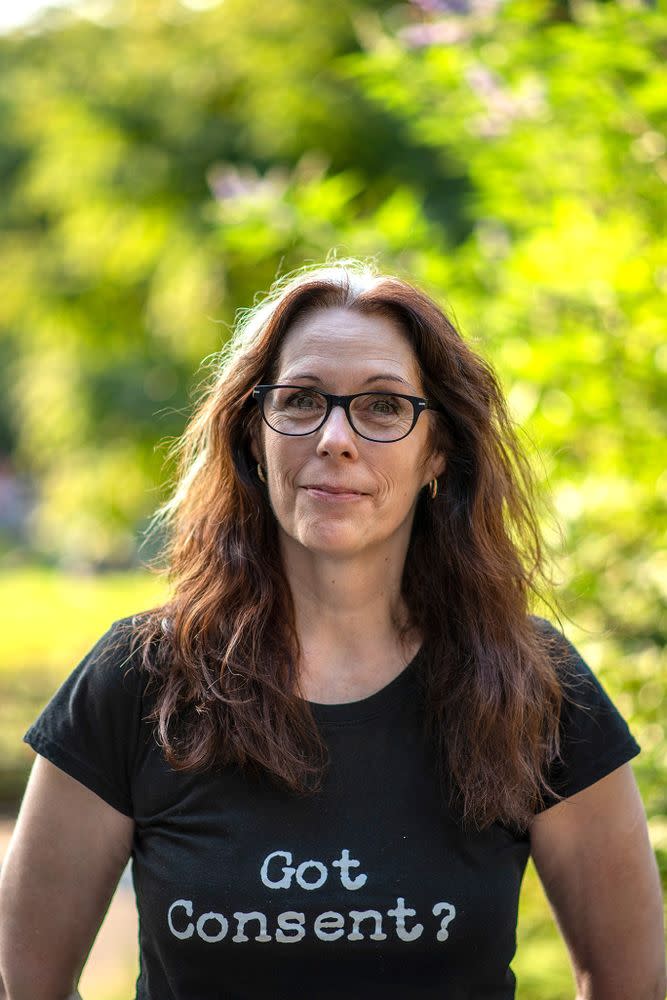Laurie Halse Anderson, Who Wrote Hit Y.A. Novel About Rape Survivor, Shares Her Own Assault Story

Some stories stem from anger.
For Laurie Halse Anderson — whose latest book Shout released this week — it was rage.
Anderson is the author of the 1999 YA novel, Speak, which portrayed a 14-year-old girl who struggles to heal after she’s raped. Twenty years later, Anderson has written about her own rape at age 13 for the first time in a free-verse memoir — because she’s incensed by criticism and doubt that has followed the #MeToo movement.
She tells PEOPLE inspiration first struck as she walked down 11th Avenue in New York City. Thoughts of the voices that seek to nullify the movement filled her head and “triggered my rage inside,” she says.
“There was smoke coming out of my fingertips and out of the tips of my hair. I was like, ‘I’m so angry,’ and so walking up 11th Avenue, lines of poetry started to drop into my head.”

When Speak was first published, it received wide acclaim and heated censorship — some schools even banned the book. Since then, Anderson’s books have sold more than eight million copies. But it was Speak that shaped Anderson’s career the most. She has spent the past 20 years touring schools where she uses Speak as a platform to discuss the culture surrounding sexual assault and consent.
“Teenagers are hungry for adults to listen to what they’re dealing with,” Anderson says.
While girls — and some boys — share their stories of rape or harassment with her, Anderson says that most of the boys she speaks with are “uninformed” about sexual violence and its costs.
“What I’ve heard from boys over and over again, is how uninformed they are,” Anderson says. “That they really don’t understand the consequences of some of this misogynistic and harmful behavior, because nobody’s ever told them.
“When I explain the long-term effects that sexual harassment and sexual violence can have, they’re stunned,” she continues. “They’re shocked, because it never occurred to them.”

Always unguarded during her speaking appearances, Anderson is making herself even more vulnerable in her poetry memoir.
In it, Anderson reveals that she was raped by an older boy she thought was a friend before the start of ninth grade. (“Looking back, I think his life was a mess. / Looking back, he still scares me,” she writes.) But the majority of the book is dedicated to her life after the attack.
Anderson’s father suffered from PTSD after his unit was sent to Nazi concentration camps to deal with the dead and the survivors at the end of the Holocaust and World War II. In order to cope, he abused alcohol for years afterward, Anderson explains. To a lesser degree, her mother did as well.
Margot Robbie Says #MeToo Changed Hollywood
Knowing her parents had their own problems, Anderson stayed silent about her attack.
“I know my parents love me. And I love them absolutely,” she says. “But things were really hard. And they didn’t have many tools to deal with what they were going through. So when I was raped, I kept my mouth shut, because I didn’t want daddy to kill the boy. And then instead of drinking, I got high, and it helped me to forget for a little while.”
According to Anderson, her rapist, who remains unidentified throughout the book, died 28 days after the attack. He was drunk when he played chicken with a car. He laid down on the dark road “daring the car that couldn’t see him / to flinch first, to prove him brave / and noble,” she writes.
Anderson went to her rapist’s funeral and cried in relief.
“I was just so grateful I wouldn’t have to see him in the halls of school,” Anderson says. “I was so fearful that he would tell everybody that he had had sex with me. Obviously, he wasn’t going to characterize it as rape.”
Since he was dead, Anderson thought her trauma was over.
It wasn’t.
“I did not know / that the haunting / had just begun,” she writes. The haunting — and the eventual healing — in Shout is what makes her story so powerful.
Like Speak, Anderson suspects that Shout will also be banned in some quarters. But she didn’t write it for the adults who may try to censor her — instead she wrote it for the survivors.
“I lost my voice for a very long time after I was raped,” Anderson said in a statement. “I lost my self, too. Shout is a poetry tapestry that shares the darkness of my silent years and shows how writing helped me speak up. Shout is a declaration of war against rape culture and a celebration of survival.”
Shout is on sale now.


